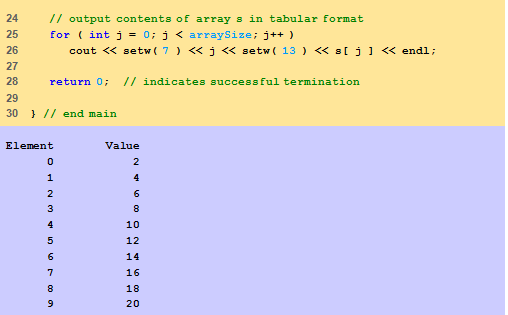Let us continue studying arrays, which we started last time. Today, we shall be looking at several examples of code.
Array Size
–Can be
specified with constant variable (const)
•const int size = 20;
–Constants
cannot be changed
–Constants must
be initialized when declared
–Also called
named constants or read-only variables
Passing Arrays to Functions
•
Specify name without brackets
–
To pass array myArray to myFunction
int myArray[ 24 ];
myFunction(
myArray, 24 );
–
Array size usually passed, but not required
•
Useful to iterate over all elements
–
Arrays passed-by-reference
–
Functions can modify original array data
–
Value of name of array is address of first
element
•
Function knows where the array is stored
•
Can change original memory locations
–
Individual array elements passed-by-value
–
Like regular variables
–
square( myArray[3] );
•
Functions taking arrays
-Function
header
•
void modifyArray( int b[], int arraySize )
•
Function prototype
•
void modifyArray( int [], int );
–
Names optional in prototype
•
Both take an integer array and a single integer
–
No need for array size between brackets
•
Ignored by compiler
–
If declare array parameter as const
•
Cannot be modified (compiler error)
void
doNotModify( const int [] );






















Post a Comment